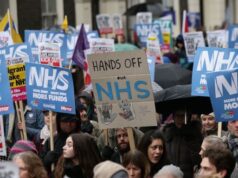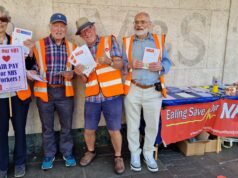In this article Professor Clara Lowy considers the changes in the urology service affecting services in Ealing Hospital.
A recent decision has been made to remove Urological surgery from Ealing Hospital – further undermining the Hospital
In 2012 the ‘Shaping a Healthier Future’ plan was born following a very limited public consultation claiming that care could be carried out better in the community rather tha in hospitals. The plan did include reassurance that provisions would be in the community before hospital bed closures.
The two hospitals marked for major downsizing were Ealing & Charing Cross. By 2014 Hammersmith & Central Middlesex had lost their A&E departments – but the promised alternative community services were not in place. As a result the A&E departments at Ealing, Northwick Park and elsewhere filled to overflow.
Despite this, the Ealing Clinical Commissioning Group and The London North West University Healthcare NHS Trust set about downsizing Ealing Hospital. First they closed the Maternity Department, then Urological Cancer Treatment, then closure of in patient Paediatric Care and A&E Paediatric Care and now in 2018 Urological Services. The reason given primarily was staffing recruitment and shortages, leading to possible unsafe practises.
A review of the proposed urological service change was presented to the Ealing Council Health & Adult Social Scrutiny Panel after the changes had been ‘enacted’ in June.
I provide here a summary of the outline of the current urological services presented to the Ealing Scrutiny Panel now available to Ealing residents.
The changes started in 2012/13 when the Urological Cancer Service ceased at Ealing Hospital. This resulted in reduced volume and diversity procedures so Health England withdrew clinical training posts. The department had a high turnover of staff, relying on temporary staff.
The options were to consolidate services on two rather than three sites, Northwick Park and Central Middlesex Hospital (CMH) were chosen. So why was Central Middlesex chosen as the second site when Ealing Hospital would have been the much more appropriate since it almost still has a full complement of services including an A&E?
8000 new urological patients attend the 3 sites, of this a quarter are Ealing residents (2000) and a fifth of these (400) are emergency admissions. The number of emergency admissions is rising by 10% per year.
This reflects the aging population in the Borough. This group also have more co morbidities and therefore should have access to an A&E and a hospital where disciplines are well integrated not only for patients with presenting urological problems but also Ealing in-patients who develop urological emergencies.
Questions and problems
As this reorganisation has already taken place Ealing patients are now being triaged in A&E at Ealing Hospital & transferred if needing admission to Northwick Park. It is envisaged that some patients will not be suitable for transfer. An on-call urologist from Northwick Park will travel to Ealing Hospital to perform the necessary operation. He or she will be operating in non-urological equipped theatre and without designated training junior staff. Is this good practice?
Ealing Hospital will continue to provide Out Patient, a One Stop Clinic and Enhanced Out Patients Procedures but as Ealing Hospital is no longer recognised for training it is not clear who will be qualified to carry out the outpatient procedures?
A statement is made that Outpatient and onsite specialist cover will be maintained.
How can this be true when an on-call Urologist has to be summoned from Northwick Park Hospital to operate on patients that cannot be transferred?
It is claimed that there will be better continuity of care. If so where is the evidence to support this claim?
Is there sufficient capacity on the NWP site to absorb the emergency urological patients arriving from the Ealing A&E?
Unless there are clear answers to these questions, we can be forgiven for concluding that the changes are driven not by clinical reasons but as part of the unsuccessful ‘Shaping a Healthier Future’ plan for North West London.
Clara Lowy is a local resident and Emeritus Professor of Medicine




